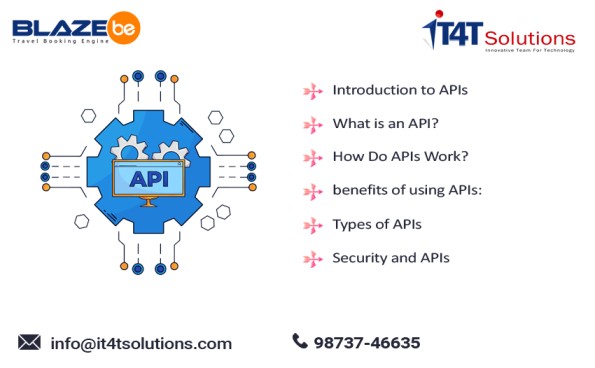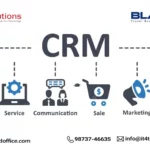What Types of API and benefits of using API?
Welcome to this digital area, nowadays communication and connectivity are just a few clicks away. Your favourites apps or websites are empowered with technology that powers it all with every seamless interaction you have with the whole world through your mobile/laptop/ or any device with the help of the internet and a major role behind all this is through APIs (Application Programming Interfaces), these little marvels make our online experiences smooth and effortless. But what exactly are APIs, and how do they work their magic behind the scenes?
Introduction to APIs
API (Application Programming Interface) is a set of rules that govern how one piece of software communicates with another. They provide a way for different pieces of software to interact with each other, without the need for human intervention.
Under the travel solutions, we use lots of APIs to connect with 100s of providers for LIVE inventory and prices for flights, hotels, transfers, car rentals even some APIs related to Weather information, exchange rates, and many other information in our day-to-day requirements.
APIs are not new; they have been around since the early days of computing. In fact, most operating systems come with a set of APIs that allow different pieces of software to interact with the system. The Windows API is a good example of this.
According to IT4T Solutions, APIs are not just for operating systems though, they can be used by any two pieces of software to communicate with each other. For example, Facebook provides an API that allows developers to create applications that work with Facebook data. This has led to the creation of some very popular applications such as Instagram. And under the Travel Technology solutions, we always provide the maximum information by using different APIs all over the world.
API’s are usually made up of a number of functions that can be called by external software. Each function will take some input data and return some output data. The input and output data will be in a format that is agreed upon by both parties beforehand. This format is usually XML or JSON.
The advantage of using an API is that it provides a well-defined way for two pieces of software to interact with each other. This means that there is less chance for errors to occur and makes it easier to develop new integrations between different systems
What is an API?
An API (Application Programming Interface) is a tool that allows two pieces of software to communicate with each other. It acts as an intermediary between the two, allowing them to exchange data and information.
An API can be thought of as a set of rules or protocols that one piece of software can follow to interact with another. This enables different pieces of software to work together, even if they are written in different programming languages. In order for an API to work, both the provider and the consumer must agree to follow its rules.
The most common type of API is a web API, which allows two pieces of software to communicate over the internet. Web APIs use standard protocols such as HTTP and HTTPS to send and receive data.
How Do APIs Work?
An API, or Application Programming Interface, is a set of rules and protocols that allows software components to communicate with each other. It enables two applications to share data and functionality between them, making it possible for one application to access the features of another.
Best travel software solutions company IT4T Says that APIs are typically designed by the developers of the two applications that will be communicating with each other. The API will define how the two applications can exchange data, and what kind of data can be exchanged. It will also specify the format that the data must be in so that both applications can understand it.
In order for an API to work, both applications must have agreed to use it and must have implemented it according to the specifications. Once this is done, the two applications can start exchanging data through the API.
There are many benefits of using APIs:
• They allow for greater flexibility and integration between different applications.
• This can lead to increased efficiency as well as decreased costs.
• APIs also offer greater security as they can be designed to limit what data is shared and with whom it is shared.
• They can make it easier to scale an application by abstracting away some of the more complex underlying functionality.
Types of APIs
There are three main types of APIs:
1. Web APIs: These are typically APIs provided by web applications, and allow for data to be exchanged between the application and third-party services. For example, the Twitter API allows developers to access tweets and other data from the Twitter platform.
2. Operating system APIs: These are APIs that provide access to underlying operating system functionality, such as file input/output or network sockets.
3. Hardware APIs: These provide access to low-level hardware functionality, such as accessing a camera or accelerometer on a mobile device.
Security and APIs
API stands for “Application Programming Interface” and refers to the various means one company has of communicating with another company’s software internally. An API would allow a third party such as Facebook to directly access the various functions of an external application, such as ordering a product on Amazon. A well-designed API makes it easy for developers to integrate their own applications with those of other companies.
However, under the Travel CRM provided by IT4T Solutions under www.travelmidoffice.com, APIs are used to ensure the smooth functioning of the booking process all. Using some external APIs to provide the best possible important information and values.
Under the IT4T Solutions APIs are a great way for developers to build powerful applications quickly and easily. By understanding how they work, you can create sophisticated applications that interface with other services on the web. Furthermore, APIs provide a secure connection between two systems which helps ensure data security and privacy. With an API in place, businesses can benefit from increased efficiency as well as improved customer experience. Ultimately, understanding APIs is essential for any developer looking to build high-quality apps and services.




